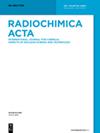Separation studies of 60Co (II) and 134Cs (I) radionuclides from aqueous solution using starch-grafted citric acid-acrylamide/magnesia hydrogel
IF 1.7
3区 化学
Q4 CHEMISTRY, INORGANIC & NUCLEAR
引用次数: 0
Abstract
In this study, three starch hydrogels composite prepared using different ratios of starch, citric acid, acrylamide, and MgO nanoparticles (referred to as St利用淀粉接枝柠檬酸-丙烯酰胺/镁水凝胶从水溶液中分离 60Co (II) 和 134Cs (I) 放射性核素的研究
本研究采用不同比例的淀粉、柠檬酸、丙烯酰胺和氧化镁纳米颗粒(简称为 St1-g-(CA-AM)、St2-g-(CA-AM)和 St3-g-(CA-AM) MgO)制备了三种淀粉水凝胶复合材料。使用傅立叶变换红外光谱(FT-IR)、扫描电子显微镜(SEM)和电离辐射显微镜(EDX)对这些材料进行了评估。使用辐射分析法研究了 134Cs(I)和 60Co(II)在这些材料上的吸附情况。研究重点是温度、接触时间、初始金属离子浓度和溶液的 pH 值如何影响吸附效率。研究发现,pH 值为 7 时吸附反应最佳,40 分钟后达到平衡。吸附动力学遵循伪二阶模型。朗缪尔模型充分解释了吸附机理,等温线模型的分析也为其提供了支持。60Co (II) 和 134Cs (I) 的单层吸附容量分别为 113.38 和 100.2 mg g-1。热力学研究表明,吸附过程是内热和自发的。
本文章由计算机程序翻译,如有差异,请以英文原文为准。
求助全文
约1分钟内获得全文
求助全文
来源期刊

Radiochimica Acta
化学-核科学技术
CiteScore
2.90
自引率
16.70%
发文量
78
审稿时长
6 months
期刊介绍:
Radiochimica Acta publishes manuscripts encompassing chemical aspects of nuclear science and technology.
 求助内容:
求助内容: 应助结果提醒方式:
应助结果提醒方式:


